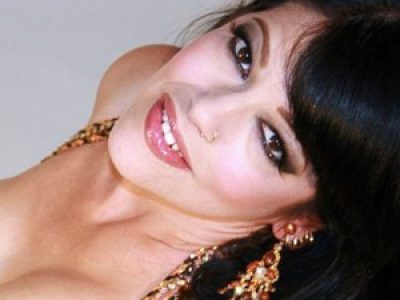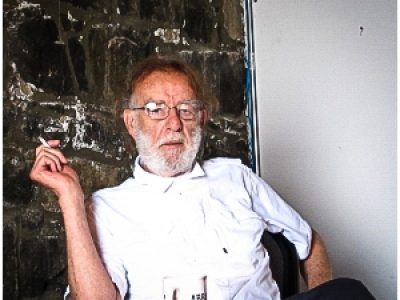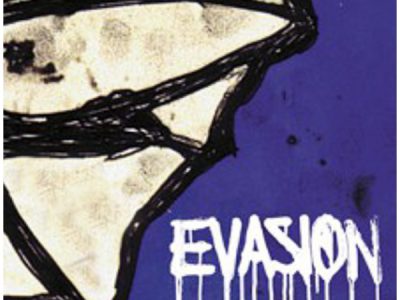Susan Vaslev
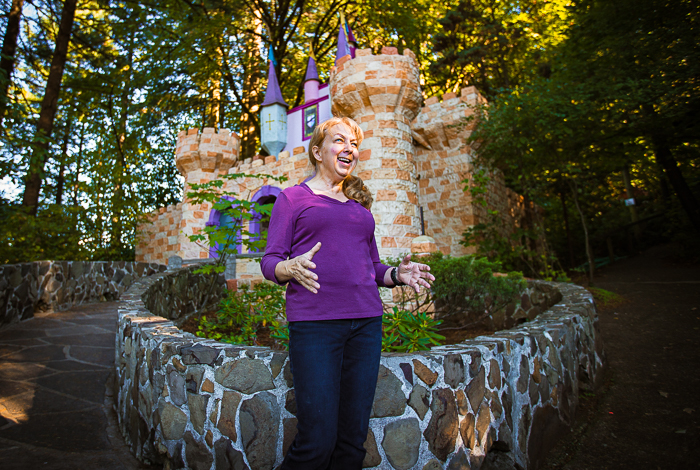
Susan Vaslev – theme park soundscape composer
winter 2015/2016
—
[ introduction ]
“Idiot Hill” was the name given to a small forested plot of land in a rural area bordering Oregon’s capital city of Salem in the mid 1960’s when Roger Tofte, an Oregon Department of Highways worker with no experience in running an amusement park, would spend his free time pouring and shaping bags of cement following an idea to construct just that – an amusement park that could become a haven for his and other local children living in the quiet area.
Built in his hours after work and on weekends, while taking on odd jobs aside from his Highways Department work in order to finance the project, The Enchanted Forest was opened 7 years later (only 5 years behind Tofte’s initial estimation.)
Storybook Trail, a collection of paths, passageways, fun house slides and subtle fairy tale scenes and characters hiding out beside and above winding forested paths that seem a world away from the Oregon cities and Interstate 5 corridor that have also grown significantly since the days when the “Idiot Hill” moniker fell to the wayside as Enchanted Forest’s attendance grew annually and Tofte found himself quitting his job at the Highway Department in order to devote all of his time to running a successful theme park.
Susan Vaslev was one of those children. While growing up around the amusement park, her father’s habit of bringing the whimsical and ethereal to life, may have been reflected in her own interests and pursuits, namely acting and music.
While Vaslev’s musical studies would eventually lead her to move to Paris to study under world-renown harpsichordist, Kenneth Gilbert, she would ultimately make a decision to step away from the competitive nature and the spotlight of touring performances, and instead return to help run The Enchanted Forest.
Her fantasia-like soundscapes tinker and dance throughout every corner of the park – from the dark and campy corners of the Haunted House to the swaying waters of the indoor Water Show – and she will sometimes appear herself along the streets of the Old Europe Village performing with her current project, Possibly Irish, for the families that continue to attend the park. She also continues to write and produce the music and shows that appear in the park’s Comedy Theatre each year, an outdoor amphitheater built at the park’s apex beneath a high canopy of trees.
Enchanted Forest remains a completely and sensically unique amusement park experience – its wide trails and fun house passageways, its animatronic effects and hand-built themed villages all rely on a more modest sense of childlike awe rather than overstimulation and cattle-like lines of Bigger!-Faster!-More! that many of today’s corporate theme park chains employ. The park acts as a magnet for local youth who are theatrically-inclined and for families wanting to experience a playground that magnifies imagination rather than trying to dictate it. And even with the growth, the addition of newer rides and attractions, Enchanted Forest remains family-owned and run, with Roger Tofte still making his rounds and touching up the paint on the castle walls or re-finishing the Wacky Shack in the hours when the crowds have gone home and the park lies empty.
Like magic, the sunbeams flow down through the shifting and trembling canopy of trees and the warm breeze brushes against the skin on this warm Pacific Northwest afternoon. This year, Roger Tofte’s crazy idea once called “Idiot Hill” will celebrate its 45th anniversary, and as parents grip the hands of children who tug wildly and point out the animatronic figures that dance inside windows, or the roller coaster cars plunging down track that weaves atop the forested hill, or try to make a break and run into the two-story tall witch’s mouth and through the corridors the climb and drop and meander and poke out through the forest before re-emerging far down the path, Susan chuckles about the park, the simple musical arrangements that have come to form the backdrop of the park, and how it continues to evolve in a way that preserves the uniqueness and charm that have made it the mystical destination that it is today…
—
[ interview ]
Susan Vaslev: I knew it was special. I remember growing up, in his bedrooms, he was doing dioramas, he’d be drawing diagrams. He was always creating in some way. He was always a painter, but he would also invent video games that he’d hope would sell. I remember he was going around painting pictures of people’s homes on dinner plates. It was crazy stuff all the time. He was continually creating.
I was 14 when we opened, but 7 when Dad started building the park. Now there weren’t a lot of people who thought he would succeed, but as a child I knew what he was going after, I knew he was making something incredible.
In hindsight, were there any ways that your dad having this ambitious idea had an affect on your experiences as a kid?
When I was growing up, the area was much more farmland. Everything was fields. When we grew up we did not have any money, but in the back of our house we had an in-ground swimming pool because my dad dug it with his own hands – just a shovel, no equipment or anything. We didn’t have any money but we had a pool! But as soon as Enchanted Forest opens, they had no time. So we went from being the nicest house in our little area to the one that’s never having the grass mowed.
Do you remember developing your interest in music?
I had a passion for music from the time I was little. My parents didn’t have any money. They went out and bought me a $75 upright piano. It was so bad the keys would stick, I got used to playing and flipping up keys as I went. I started when I was in first grade. My mom had played piano enough to teach me my first year, and then she decided I was beyond where she was, she couldn’t teach me anymore. I went through different teachers as I progressed.
I started touring locally when I was 11 years old, and by the time I was 14 I was also playing the organ and I had toured the US and Mexico.
Can you talk about your musical studies? It seems like you would have progressed beyond normal instruction aimed at your musicians your age…
As a high school student, there were instructors for piano and organ at Willamette University so I went to the university to study. When I graduated high school, I went to the University of Oregon and added the harpsichord, and then completed that. And then I went overseas to study. For one Summer I was in the Netherlands and Germany, and then I met Kenneth Gilbert who was one of the top harpsichordists in the world. I asked if I could study with him, and he said, ‘Yes.’ Then I went to live in Paris for a year.
That’s what I did for a year, and I saw what it was really like on that top echelon of performers. I got to see that with him and with performing in Paris, and I saw it was really a dog-eat-dog world. To be where he was at, it appeared to me that you basically had to give up everything. So I came back here after a year over there thinking that I would work here during the Summer and then go back and live in Paris during the Winter, but then somewhere along there I just decided, ‘no, I don’t think that’s the life that I want.’
Right after thinking this, I met my husband. My mom had gotten cancer before I went to Paris, but I was needed more to run the business. If people need you, they need you, and you need to come back and do what you need to do. So it was like everything just clicked. This is where your life’s going to be.
Did studying music in Paris seem like a romantic era to you at all?
I lived like a dog, [laughing] I had no money. I think those times, when I get in those moods when I remember how wonderful the lifestyle was, I’m forgetting everything that wasn’t good about it. I could go to the Louvre on Sunday for free. I got extremely sick, and then you think of things like just getting a taxi to get across town to the doctor was a huge deal. I remember eating as cheaply as I could possibly eat and things like that.
What role did you take with the park when you returned?
When I came back, my mom was definitely ill, so I stepped into running the business with my sister. And I was running the theatre every Summer, there was never a Summer that I didn’t do that.
What year did you return from Paris?
This must have been around 1980.
Were these songs that you had already written or were they written as the attractions opened up?
The music was recorded at all different times. The songs were written specifically for whatever I was writing for at the time. Everything back then was recorded on a Fostex 8 track tape deck. Things like the water show would’ve been after I got back from Paris. I remember having my little boy with me as I was programming the water show, with him helping me flip levers for the water show, because we have this box thing that would do it. Not like computers nowadays.
I don’t believe the English Village was built. Things like the Castle, they’re the very early recordings that are on there.
And then there are much later things on there. Romeo and Juliet, I was doing that for Willamette University, that was much later. And the Challenge of Mondor, that’s considerably later because Mondor, that’s… 10 years ago?
And your newer music has to reflect some of the changing complexity of the attractions going into the park…
Mondor is four and a half minutes… and that doesn’t sound like much, but when you’re writing music… [laughing] The water show is something like seven and a half minutes. It’s made up of tons of little, like vignettes of water and light, so it’s gotta have different music through the whole thing… and that’s a lot of music!
It does seem funny, given your background in studying under very disciplined musicians and writing and performing on the scale that you were at, hearing you mention the challenges of returning and having to write pieces for the park.
Here’s a funny story. I’ve got some music that, on the album, are more compositionally challenging, but fairly early on, a lot of the music out here was very simple. BMI Licensing paid me a visit and did not believe the music was mine. I had to show them where I record, all my manuscripts, everything I did, and so the guy that they initially sent out believed me. I believe BMI’s in New York, and they didn’t believe the guy they sent out, so they sent somebody else out, who I had to do the same thing all over with. You know, it’s a weird feeling to have people not believe it’s your music! He saw where I recorded, all the manuscripts with all the stuff scratched out. I said to him, ‘I really don’t understand what the big deal is, because a lot of the music I’m showing you is pretty simple.’ Not everything, but why this huge thing about me? And he said, ‘You don’t understand, you’re the only amusement park in America that doesn’t pay us!’
So we’ve been very careful to make sure that everything out here is either my music, or if there is a performer coming, they only get to come if they’re performing traditional music or their own original music. For a long time too, even happy birthday was copyrighted where you couldn’t use it, so I wrote out own happy birthday song. And now, that song has just become public domain I believe, but we don’t wanna use it now because we like our own song.
So you taught yourself the recording for these songs?
Yeah. I record for the whole park, and for the theatre. And you figure every year there’s a different show at the theatre. Even if it’s a show that I’m repeating, a show that I’ve done before, I’m constantly updating, I have to add new music. What will happen if I bring back a show in the theatre, usually I’m scratching whatever I thought was the weakest song in the show. There will usually be at least one new song each time I do a production, and then I will have to re-record the whole thing.
Like I said, I started out on a Fostex 8 track, and then progressed to simpler recording software. By the time we got to things like The Challenge of Mondor, because there are no rooms, one sound flows into the next, so I had to record 8 things that would have to play synced up from one end of the building to another, so they all have the same chord progression. I needed a software that would accomplish that and that’s when I made the jump into Q Bass. Now I record everything in Q Bass.
I like the learning-on-the-fly nature of writing and recording for the park! Do you have a similar way of working this into the creating aspects of the music and the production rather than just the recording aspects?
The first year at the theatre, we did something that had a lot of different scenes in it, it was more of a talent show type of thing. It wasn’t quite as satisfying to be doing little things, so we jumped to The Princess And The Pea.
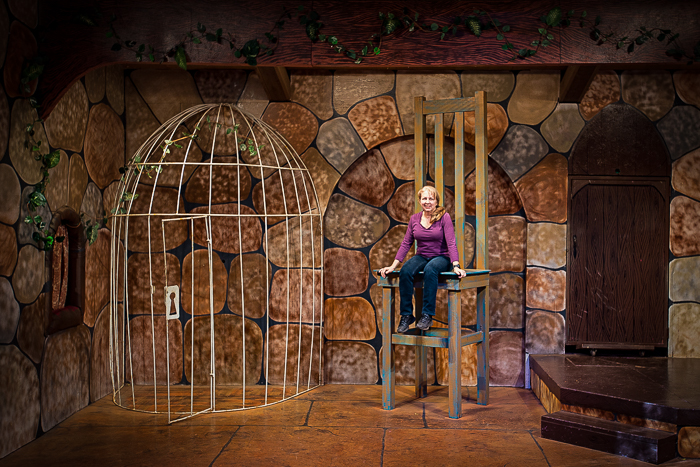
And along with writing, you were designing the costumes as well, right?
Yeah, I’d design and sew the costumes. Last year I had help sewing, which was awesome. [laughing]
So the theatre has grown along with other aspects of the park?
It’s a lot bigger now. Now we have understudies, we have a whole artistic ensemble that does other things in the park too. I have an assistant director now.
Have the shows you present also evolved?
I’ve kept everything from the beginning, so I can see exactly how the plays progress from one year that I do them to maybe 8 years later when I might bring that play back again. I have to cut maybe 50 percent of the jokes because they’re no longer… nobody knows what the jokes mean anymore. And tastes change. Tastes now are very fast-paced. So the pacing of the shows, the songs, they’ve gotten shorter and faster in my shows.
I’m watching TONS of shows, like hundreds of shows a year, and you can see what’s really working and what isn’t. Even throughout the Summer we’re continually working the show, fine-tuning it. As you tweak it, you can find out what’s successful and what’s not.
Now despite the growth and the additional help, the park is still primarily a family-run project, right?
The core of it would still be my father, my sister Mary, and me. We’ve got a lot of great people in our family with a lot of varied interests, for instance my youngest sister is not in the business. She was for awhile but she left to become an architect. But she understands that business and what we’re going for and we always hire her as our architect. And of course we ask the opinions of different people, but the core decisions, that’s us who’s making them.
Everything used to be done by us, we used to do it all ourselves as far as the hiring and all the training, but we found that we can actually do a better job having other people do that so that we can devote more time to the park operations. As far as the construction of the rides, in the early days, Dad, or people working with us would have constructed every inch of the building. Now if we have a concept, we’ll hire a construction company to build the shell of the building. There just aren’t enough hours in the day to totally do that anymore, so we’ll put our efforts into the artistic side of it. We try to use everybody’s strengths where they are best utilized.
As far as the construction of the rides, Dad doesn’t do the construction of the rides at all. The actual mechanics will almost always be hired out. We want everybody to be safe! [laughing] But the actual artwork, the whole concept of the ride, we’ll be doing.
I think everybody really responds to that fact, that it’s one of a kind. And it’s a family that did it, and it’s a family that is still doing it!
In terms of future plans, what do you keep in mind as being your biggest priorities?
We always have to think long-term, how are you going to keep the business in the family? We’ve watched other parks come and go as they’ve overextended themselves on loans. It’s very expensive running an amusement park, and you have to think about how you’re going to pay all your bills.
In the early days, there was this feeling that you never want to take out a loan. So they first took out a loan for $2000 and that was it. It was great for getting started in the business because you never wanted to make stupid mistakes, but later there did come a point where we were putting the business in more risk thank if we actually take the loan out and have some cash in reserve in case something goes wrong.
Today we would never overextend ourselves on loans, but that means you won’t see us expand as fast as someone else who is able to go and take out more loans.
I love going to other theme parks, because I appreciate everything they do so much. I don’t think there’s a theme park I go to where I don’t think, ‘oh my gosh, the money it would take to do that!’ I’m aware how different their budgets are from ours. I see things they’re able to do and I’ll drool. But that’s just where we have to know who we are and embrace that so we can be different.
We have plans into the future, it’s just which project to choose from. Whenever we’re choosing a project, we’re always thinking, ‘what are we missing?’ because it’s important for a small park like ours to keep adding something we don’t already have, something that’s not competitive with something you already have that can get you more variety. That’s always the question, ‘what’s the next thing that would be the most valued by our guests?’
It does seem like it could be a pretty unusual family dynamic!
It’s interesting because my mom wrote the book on the history of the park. But we all see things just a little bit differently, where we’re like, ‘it didn’t happen that way!’ My dad will be like, ‘it didn’t happen that way,’ and I’ll be like, ‘yes it did! I remember that!’
I know it’s been a complaint of our kids growing up, that when we’re together we can’t not talk business. [laughing] But it’s just because that’s our life, you know?
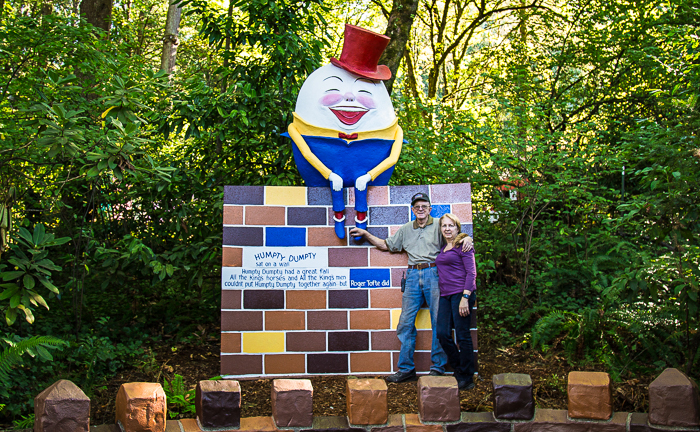
—
Susan’s album, Music From Enchanted Forest, is available on limited edition vinyl release at Wyrd War Records.
More information Enchanted Forest amusement park is available here.
